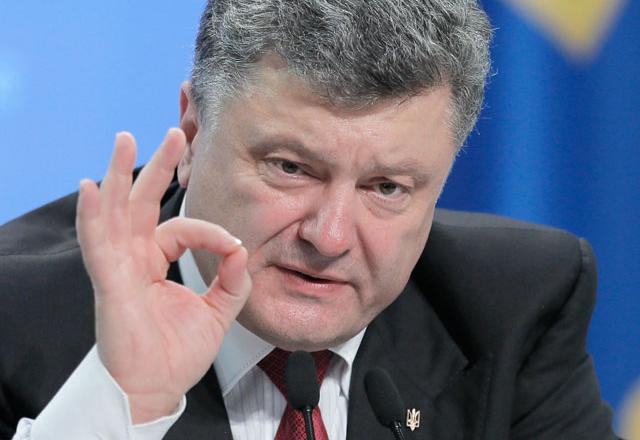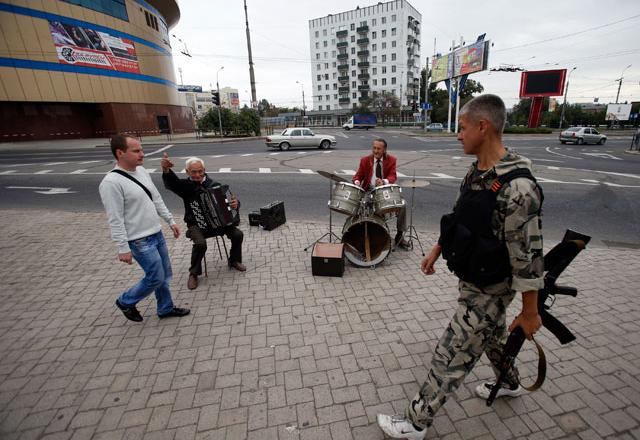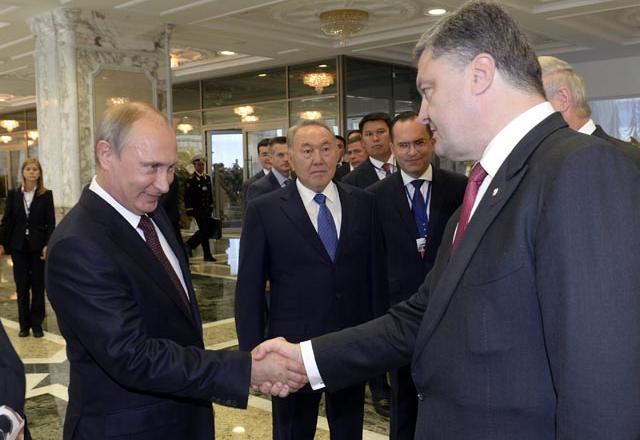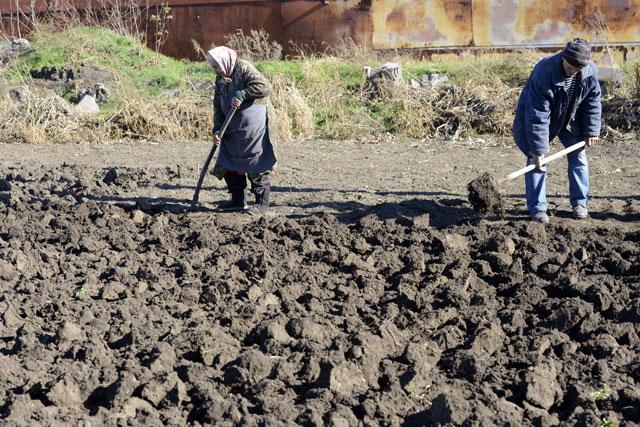You are here
Ukraine leader sees end to war, eyes EU membership by 2020
By AFP - Sep 25,2014 - Last updated at Sep 25,2014

KIEV — President Petro Poroshenko on Thursday proclaimed an end to the "most dangerous" part of Ukraine's pro-Russian uprising and the start of a post-war recovery that would lead to an EU membership bid in 2020.
But the upbeat message was clouded by new deadly clashes and a defiant decision by guerrillas to hold independent elections on November 2 that Poroshenko said he hoped Russia would not recognise.
The pro-Western leader told the first press conference since his June inauguration that he would never let a resurgent Kremlin and gunmen entrenched in Ukraine's eastern rust belt halt Kiev's ambition to break out of Russia's embrace.
"We suffered for too long in the socialist camp to let someone lower an iron curtain across our western border," Poroshenko said in reference to Ukraine's Soviet past.
"I have no doubt that the biggest, most dangerous part of the war is already behind us thanks to the heroism of Ukrainian soldiers."
The five-month conflict has killed more than 3,200 people and driven 650,000 from their homes across a bomb-scarred region that once served as the country's economic driving engine.
Poroshenko showed he was determined to continue on a Westward path as he unveiled a comprehensive package of social and economic reforms, dubbed Strategy 2020, which he said "will prepare Ukraine to apply for membership in the European Union in six years".
The plunge in relations between Moscow and Kiev came after the February ouster of a Moscow-backed leader, followed by the Kremlin's annexation of Crimea and its alleged backing of a bloody pro-Russian revolt.
An unexpected militia counteroffensive at the end of last month was only halted when Poroshenko agreed to a truce the Kremlin helped partially draft.
The plan called for rebel-held regions to hold local council elections on December 7 to help restore law and order.
But separatist leaders soon objected because it gave them only limited self-rule for three years. They now plan to form their own "Supreme Soviet" parliament and elect a formal government.
"I hope that neither Russia nor the rest of the world recognise elections called by self-proclaimed terrorist organisations in violation of Ukrainian law," Poroshenko said.
EU and NATO ambitions
Poroshenko's revival programme includes 60 proposals to improve his country's chances of European Union membership — a bid the wealthier European nations currently view with mistrust.
The proposals include efforts to tackle rampant corruption and reform the country's bribe-infested justice system.
Poroshenko also promised to gain "energy independence" — a reference to Ukraine's heavy reliance on Russian natural gas.
A politically-charged energy price dispute — whose end EU officials will try to broker in Berlin on Friday — saw Russia cut off Ukraine's gas taps on June 16.
The row, along with the escalating costs of war and the shutdown of giant industries in the east, have only accelerated Ukraine's economic implosion.
Growth is expected to slow by 7 to 10 per cent this year and put still more pressure on Poroshenko ahead of parliamentary polls on October 26.
Poroshenko has responded to charges of weakness in the face of Russia by announcing plans to seek NATO membership — a step the Kremlin views as a direct national security threat.
The president reaffirmed his intentions on Thursday by tweeting that he had just "instructed the Cabinet minister to revoke Ukraine's non-aligned [nation] status".
Sealing Russian border
Both Kiev and its Western allies accuse Russia of supporting the rebels in eastern Ukraine by sending in elite forces and heavy weapons.
Russia denies the allegations and dismisses NATO satellite imagery purporting to show Russian troops in Ukraine as fabrications designed to back the military alliance's expansion towards its border.
But rebels are continuing to use sophisticated weapons to launch sporadic raids and on Thursday a soldier was killed on the outskirts of the government-held southeastern port of Mariupol.
Ending weeks of speculation, Poroshenko on Thursday ordered his government to prepare a temporary closure of the 2,000-kilometre land frontier with Russia as part of efforts to halt its "intervention" in Ukraine's state affairs.
A senior Ukrainian security source told AFP that the border security measures would affect all road traffic and come into force "soon".
A spokesman for Ukraine's state border service said no additional security measures had yet been taken and that cars were still allowed to pass along the dozens of border crossings linking the two countries.
It was not clear how Ukraine intended to implement the measures along the 260-kilometre stretch of the border controlled by insurgents in the separatist Donetsk and Lugansk regions.
But the decision look set to further hurt Ukraine's recovery chances by halting trade between the mutually dependent nations and increasing the likelihood of Russia adopting retaliatory steps.
Related Articles
The Ukrainian military said Monday it was preparing to pull back its guns from the frontline in the separatist east as a fragile truce with pro-Russian insurgents appeared to be taking hold.
The presidents of Russia and Ukraine hold key talks Tuesday with little hopes for a breakthrough in resolving the raging conflict pitting Kiev against pro-Moscow separatist rebels.
Ukraine on Tuesday condemned as "destructive and provocative" Russia's stance towards elections organised by pro-Russian separatists in eastern Ukraine next Sunday, saying Moscow's recognition of the vote could wreck chances of bringing peace.



















